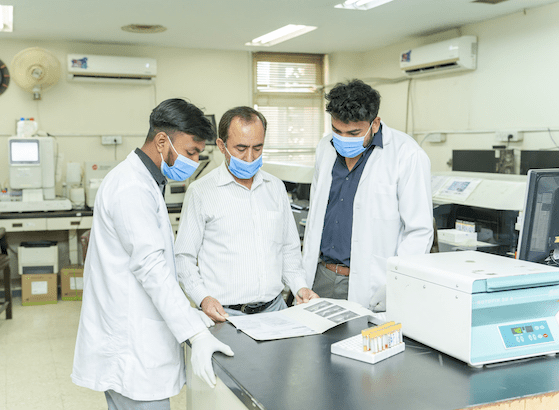A well-functioning medical diagnostic laboratory network is critical for a strong health system in any country. Diagnostic laboratories play an important role in helping control communicable diseases, such as COVID-19 and other viral and bacterial infections. By providing accurate test results and disseminating timely reports, including those that identify infectious disease cases, these laboratories can help health authorities respond quickly to public health threats.
To provide accurate and credible results, however, these laboratories must operate at a specific level of quality and competence as defined by international standards, such as ISO 15189 accreditation, which ascertains a medical laboratory’s quality. But in Pakistan during the first year of the pandemic, only 15 private and two public diagnostic laboratories – of approximately 347 public health labs – were operating with international accreditation. Without accreditation, public sector laboratories may not provide reliable diagnostic or test results. As a result, health authorities may lack the necessary data to make critical decisions to protect the public’s health, especially during a health crisis like the COVID-19 pandemic.
To strengthen this important part of Pakistan’s health system, the Promoting the Quality of Medicines Plus (PQM+) program, funded by the U.S. Agency for International Development (USAID) and implemented by the United States Pharmacopeial Convention (USP), helped improve the diagnostic laboratories at two public sector hospitals: the Institute of Public Health Medical Lab in Lahore and the Pakistan Institute of Medical Sciences (PIMS) Medical Lab in Islamabad. PIMS is one of the largest government tertiary care hospitals in Islamabad Capital Territory, serving on average more than 1,200 patients per day.

Improving laboratory practices
In collaborating with PIMS staff, PQM+ assessed the laboratory’s practices and competencies and found that the lab lacked standardization and documentation of testing methods, which can lead to inconsistent results. The hospital had no standard operating procedures (SOPs) for regular equipment maintenance despite frequent breakdowns and required repairs. The laboratory also lacked an established process to ensure timely calibration of medical equipment, a critical requirement for ensuring instruments perform accurately and produce reliable results. No equipment to monitor the laboratory environment, which is vital for minimizing the risk of contamination and ensuring accurate results, was on site.
Based on the findings, PQM+ worked closely with PIMS management to implement a quality management system (QMS), a collection of business processes — such as procurement, document management, and equipment care — to ensure a high quality of products and services. PQM+ helped PIMS develop and implement SOPs to ensure consistent testing methods aligned with international quality standards. PQM+ also introduced an equipment management process for the lab to reduce repairs and delays in test reports. PIMS management agreed to procure several hygrometers, tools that are necessary for monitoring the lab environment, to ensure that the lab conducts all tests under controlled temperatures and with reduced contamination risks. PQM+ also provided guidance to PIMS on using transportation boxes with ice packs. These changes will significantly reduce inaccurate test results caused by mishandled samples.
“The technical assistance from USAID’S PQM+ program was very helpful in improving the day-to-day systems and procedures, resulting in quality-assured and more timely services. We are thankful to USAID for their support with the process of achieving ISO 15819 accreditation for the diagnostics lab,” said Dr. Muhammad Fiaz, Deputy Manager for QMS at PIMS in Islamabad.
Performing diagnostic tests that meet global standards
The PIMS lab collects and handles COVID-19 samples, then sends them to the National Institute of Health in Islamabad for final testing. Careful and accurate sample collection, handling, and transportation are critical steps in the diagnostic testing process, which the PIMS lab now effectively performs, as reflected in its recent ISO 15189 certification by the Pakistan National Accreditation Council.
To build sustainability, PQM+ trained PIMS lab staff to maintain and fully run the laboratory independently. By providing reliable diagnostic services, PIMS is helping generate accurate data, which the health care system in Pakistan can use to take regulatory actions and help control and prevent the spread of infectious diseases. As a result of USAID’s support, the PIMS lab can perform thousands of medical tests each day, including for hematology and immunology, that meet international quality standards.
